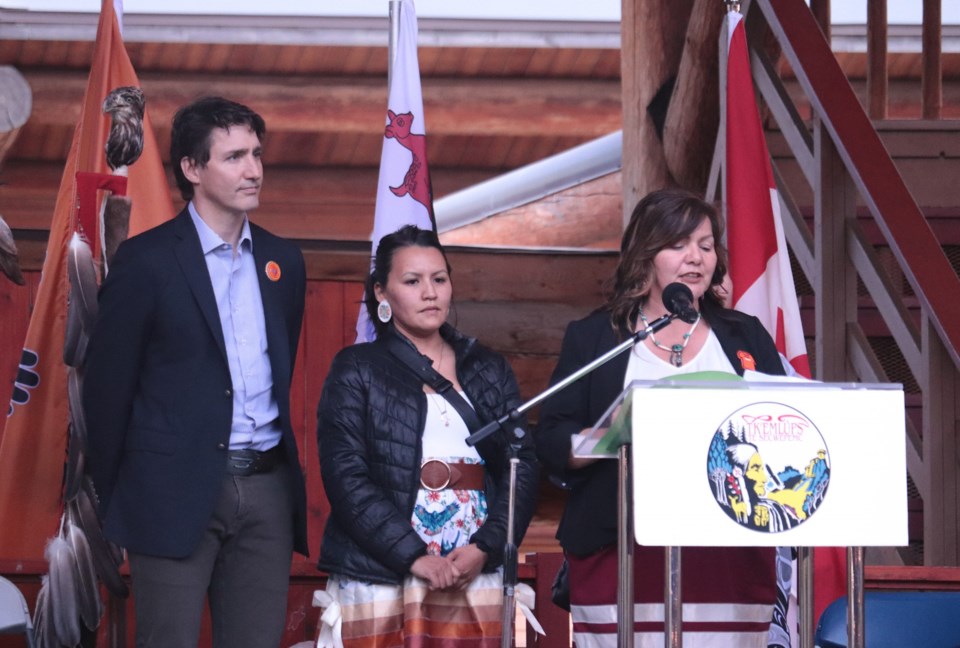Trudeau arrived at the Tk'emlups Powwow Arbour on Monday afternoon, meeting with Kukpi7 Rosanne Casimir and band councillors before speaking in front of attendees gathered to honour those who never returned home from the former Kamloops Indian Residential School.
“Some of the children who went missing would have been grandparents or great grandparents, they would have been the elders, knowledge keepers and community leaders. It is on all of us to remember them,” Trudeau said.
Trudeau committed to support TteS as the community heals and plans its next steps in regards to the unmarked graves.
“We're here for you. We'll continue to remember the children who never returned, and to support one another as we walk forward together on the shared path of reconciliation,” Trudeau said.
As Trudeau entered into the arbour, he stopped and talked with people in the audience and exchanged hugs with some.
However, some attendees met Trudeau with chants of “Canada is all Indian land,” “We don’t need your Constitution,” and cries of “You’re not welcome here,” as he started to speak.
Trudeau said he heard their concerns, noting he had also heard from a number of elders they wanted to hear him share his reflections about the memorial event.
After the event ended, Trudeau said he was touched to be warmly welcomed by many, and also recognized the anger directed towards him.
"There was also anger and frustration and mistrust and that’s totally, totally legitimate. What so many people have been through in terms of layers of trauma they have gone through, if it makes anyone feel a little bit better to shout at me, then please, shout,” Trudeau said.
“This community needs and deserves healing and my job and our job as a federal government is to be there to accompany them.”
Trudeau said he discussed various projects with Casimir and council on Monday, including community asks like a healing centre, an elders’ lodge and a museum.
He said the facilities are “priorities,” on top of other needs such as housing, mental health supports, and economic development.
Trudeau said it’s important that Tk'emlups — including elders, survivors and community leaders — lead the way when it comes to determining what the First Nation needs.
He said Patty Hadju, Minister of Indigenous Services, and Marc Miller, Minister of Crown-Indigenous Relations, are “closely engaged” with Tk’emlups leadership on these projects.
“It's a long process to get things done right, because they can't be decided from Ottawa, they have to be driven and shaped by the community,” Trudeau said.
“Many, many years of well-intentioned governments in Ottawa saying, ‘Okay, this is what you need here, this is what you need there’ didn’t solve problems, but continued to perpetuate them. Making sure that local leadership has the leadership over these projects is at the heart of what we need to do going forward.”
Monday’s all-day memorial event began with a sunrise ceremony at 5 a.m. and drew hundreds to the Tk’emlups Powwow Arbour to listen to speakers, dancing and drumming.
A number of municipal, provincial and federal government representatives attended, and Casimir thanked them for their attendance and support.
“We have a respectful support from all levels of government, and we need to as we navigate these next steps and continue to educate the wider public about the true collective history. This truly is a shared journey,” Casimir said.
Gov. Gen. Mary Simon — Canada’s first Indigenous Governor General — addressed attendees earlier on Monday.
Simon said for too long, Indigenous people were silenced by churches and governments through residential schools and “corrupt policies.”
She said although Indigenous communities still feel the impact today, there is hope for healing.
"For these children, their stories were cut short, but you won't let it end like this. By speaking up, you strip away the anonymity forced upon them by the school,” Simon said.
She said it’s up to all Canadians to tell the stories of these children.
"This is a responsibility all Canadians share, we all need to listen, we all need to understand. It is important that we teach the real history in our schools, the good and the bad,” she said.
“By incorporating this truth into our curriculum, we make sure the next generation grows up dedicated to building and restoring relationships, to reconciliation, to see things differently, and to valuing Indigenous knowledge and stories.”



